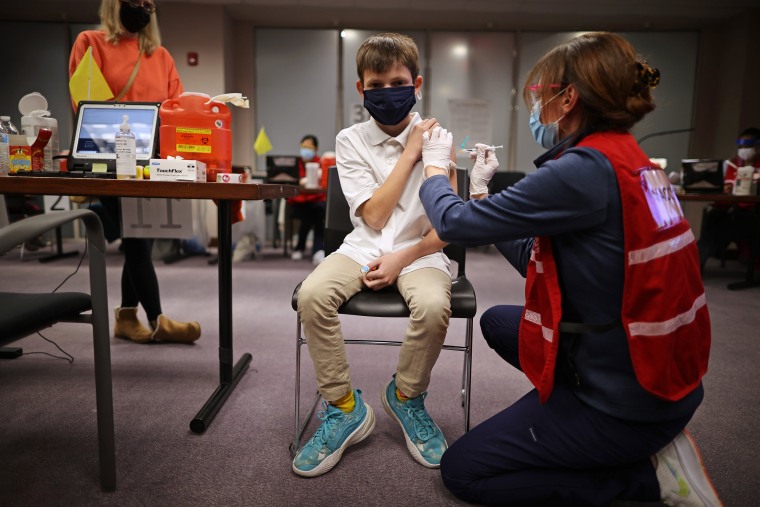The approval this week by the Food and Drug Administration for a vaccine for children will be the impetus for some parents to increase their employment or return to in-person work. But for others, different needs and benefits are of more concern.
When the latest U.S. Census Household Pulse Survey asked respondents their main reason for not working, 4.9 million people said they were caring for children not in school or day care, and 2.4 million people said they were concerned about getting or spreading the coronavirus.
Expanded vaccination may encourage some child care workers to resume providing after-school and day care work, opening up employment options for parents, largely women, on whom child care burdens have mainly fallen. It will be the reason for some parents who opted for remote or homeschool to send their children to in-person schooling.
Employees who have used their kids as a reason to work from home "will lose that as an excuse."
And it could assuage concerns for some parents who were worried about transmitting the virus to or from their child and their fellow colleagues or commuters.
Nicole McNulty, a 46-year-old mental health therapist from Seattle, reduced her work hours last year when schools resumed as virtual and she needed to provide after-school care for her son with a learning disability.
“The vaccine changes things for me, because I’m a single mom and widow and have only been working part time due to fear of school switching back to online with exposures and need for quarantines,” she told NBC News this week. “Once a larger portion of our schools are vaccinated I will feel more confident returning to full-time employment as we will see less quarantine time and more consistency in schools.”
Some workers who have kept their unvaccinated child in remote schooling for virus concerns say they will now send their kid to in-person school.
Alicia Erickson, a 43-year-old, has a vaccinated 12-year-old and an unvaccinated 9-year-old daughter.
“As soon as we can get an appointment, I’ll be sending her [to school],” Erickson said.
Erickson is also now a virtual teacher. She started an online tutoring business for dyslexic children at the start of the pandemic to safely generate income while taking care of her own kids at home.

“Once children are vaccinated, I will offer in-person tutoring in addition to virtual,” she said.
Human resource professionals don’t expect an immediate surge of workers coming back to physical workplaces because of the vaccine authorization for children. For starters, it will take children at least a month to become fully vaccinated.
“Employers can count on somewhat of a lowering of resistance from some of their employees, over the coming months [to returning to in-person work],” said David Lewis, CEO of human resources firm OperationsInc. “Over time, employees who have used their kids and the lack of vaccination ability as a reason for them wanting to work from home will lose that as an excuse.”
But for the majority of the parents NBC News spoke with, the previous lack of a vaccine for their children was not the overwhelming reason why they opted for remote work or staying out of the workforce. And its availability will not be a sudden trigger to send them rushing back into the physical workplace.
For some parents, it’s their employer's stance on in-office presence that is the main determinant of whether they are in the office or not.
“For the most part, my friends who work in offices are remote or hybrid regardless of their child’s vaccination status,” said Ariana Garcia, 27, a single mother and real estate agent in Lancaster, Pennsylvania. “And those of us who weren’t have sent the kids to school because, work-wise, we need to physically be there and didn’t have much other choice,” she said.
Other parents say that even after the kids' vaccinations roll out, they need to remain as a remote worker in order to be able to provide care if their child’s class has to quarantine or go remote due to a Covid case or outbreak.
Abbey Bailey, a 37-year-old employee assistance program counselor from Austin, Texas, whose husband works in IT, said they are both “settled” into their new remote jobs and plan on keeping them that way. They pulled their children from in-person schooling and began homeschooling until the kids could be fully vaccinated.
“It’s hard to transition all the time from a traditional job to a remote job,” Bailey said. “This is kind of a way to make sure if day cares close again or schools go remote we have a fallback plan.”
For some parents, it’s their employer's stance on in-office presence.
And while some parents got vaccinated themselves, they want more information before signing their child up. In a late October survey by the Kaiser Family Foundation, 76 percent of parents of children ages 5-11 said not enough is known about the long-term effects of the Covid-19 vaccine in children, and 71 percent said they are concerned about serious side effects. And 30 percent said they would "definitely not" vaccinate their children.
“We must consider that, regardless of children’s vaccine eligibility, there will still be parents who have vaccine hesitancy at this stage for their young children, leading those to stay in remote roles,” said Bhushan Sethi, global people and organization co-leader at PwC consulting firm.
Other workers said remote work’s convenience, productivity and flexibility were stronger incentives to stay working from home. Vaccination for children might give some parents peace of mind, but it likely isn't enough to nudge them back onto cramped subways or into cubicles in mostly empty offices. Experts agree.
“From where I sit, and from the many leaders across the U.S. and the world that I speak to and work with on a regular basis, I do not believe business and organizations see a close tie between kids' vaccinations and return to an in-person office setting,” said Steve Cadigan, a human resources and leadership adviser.
“The taste of freedom, autonomy and independence of schedule is a far more powerful part of the return to office math than kids’ vaccine status,” he said.

